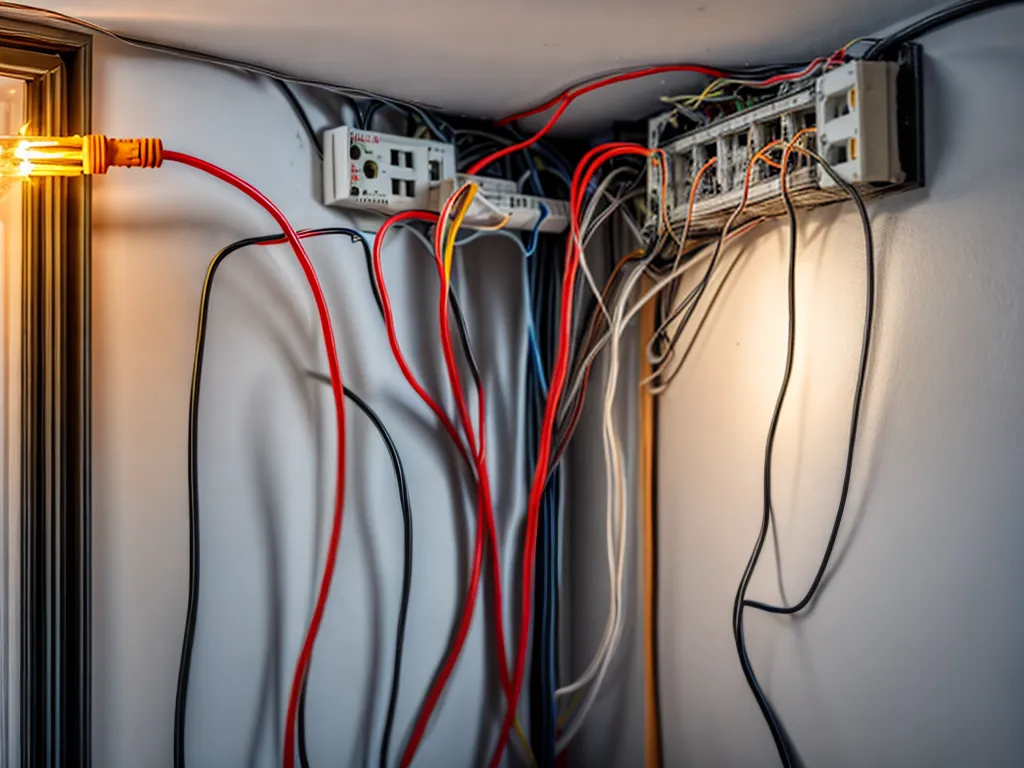
Electrical fires are a leading cause of home fires, resulting in over 50,000 fires each year in the United States alone. Rewiring your home properly can significantly reduce your risk of an electrical fire. In this comprehensive guide, I will cover common causes of electrical fires and how to avoid them through proper rewiring techniques and electrical maintenance.
Common Causes of Electrical Fires
Electrical fires often start from faulty electrical wiring and equipment. Here are some of the most common culprits:
Overloaded Circuits and Outlets
Plugging too many appliances into outlets on the same circuit can lead to an overload. Outlets and wiring can overheat from the excess current flow, igniting nearby combustible materials.
Signs of an overloaded circuit include:
- Frequent tripping of circuit breakers or blown fuses
- Warm or discolored outlets and switch plates
- Flickering lights
Faulty Electrical Appliances and Equipment
Defective appliances like air conditioners, space heaters, and kitchen appliances account for a large share of electrical fires. Specific problems include:
- Frayed or damaged power cords
- Malfunctioning motors or internal wiring
- Loose electrical connections
Routinely inspect cords and plugs for all appliances and electronic devices. Discard any with cracks, exposed wires or loose prongs.
Degraded Wiring and Outlets
Wiring and outlets that are very old can degrade over time. Insulation can crack or pull away, exposing bare wires. This creates a fire hazard. Older homes may still have outdated 60 amp electrical systems, which can overload from running multiple high-wattage appliances.
Inspect outlets and switches for discoloration or cracked plastic housings, which indicate damage. Use an outlet tester to check for faulty wiring.
Improperly Installed Electrical Work
Incorrect DIY electrical work is a major cause of electrical fires. Common mistakes include:
- Overloading circuits with too many outlets or lights
- Incorrect wire gauge for the circuit
- Loose electrical connections
- Failure to use appropriate wiring and boxes
Always have a licensed electrician handle any major electrical work like installing new circuits.
Preventing Electrical Fires through Proper Home Rewiring
Rewiring all or part of your home allows you to bring the electrical system up to the latest safety standards. This can significantly reduce electrical fire risks.
Full Home Rewiring
A full rewire involves replacing all existing wiring and electrical infrastructure with new wiring. This is necessary for very old homes, as old wiring is simply too degraded and unsafe to patch up.
Full rewiring ensures the entire electrical system is designed properly and uses modern, flame-resistant wiring. It also allows increasing service capacity to meet new electrical demands.
Targeted Circuit Rewiring
For newer homes, you may only need to rewire certain problem circuits instead of the whole house. Some key things to target:
- Overloaded circuits: Rerun wires with higher gauge or split into multiple circuits
- Old knob-and-tube wiring: Replace with modern NM cables and boxes
- Kitchen/bathroom circuits: Update to GFCI outlets for protection
- Lighting circuits: Update wiring with adequate capacity
Install New Safety Features
A rewiring project also provides an opportunity to add new protective electrical devices, such as:
- AFCI circuits: Protect against arc faults, a leading cause of electrical fires
- GFCI outlets: Protect from electrocution and shocks
- Whole house surge protector: Protect electronics from power surges
- Higher capacity panel: Allows adding more circuits
Hire a Licensed Electrician
Due to the complexity involved, always hire a professional licensed electrician to handle any rewiring work. Pay close attention to credentials and experience.
An experienced electrical contractor will:
- Evaluate your home's current wiring condition
- Recommend the appropriate scope of rewiring
- Obtain necessary permits and arrange inspections
- Install new wiring to the latest NEC safety standards
Create a Realistic Budget
The cost of rewiring a home varies greatly based on factors like location, size of the home, and scope of the project. On average, expect to pay:
- $8,000-$15,000 to rewire a 2,000 sq ft home
- $15,000-$30,000+ for a full rewire of a larger or very old home
Create a realistic rewiring budget and get multiple quotes before starting. Take advantage of any electrical safety rebates your utility may offer.
Maintaining Electrical Safety
Proper maintenance is crucial for reducing electrical fire risks, even after rewiring your home. Here are some key electrical safety tips:
Inspect Electrical Systems Regularly
- Check for loose, damaged or overloaded wiring, cords and outlets
- Test AFCIs and GFCIs monthly by pressing the test button
- Check appliances and equipment for signs of wear
- Hire an electrician periodically for a full inspection
Exercise Caution with Electrical Appliances
- Replace old appliances like refrigerators and AC units
- Never leave cooking appliances unattended
- Turn off tools when not in use
- Use surge protectors for electronics
Upgrade Outdated Electrical Components
- Consider upgrading fuse boxes to modern circuit breaker panels
- Install tamper-resistant outlets if you have small children
- Upgrade undersized wiring to power newer appliances and devices
By rewiring your home properly and following safe electrical practices, you can greatly reduce the risks of electrical fires. Be proactive about electrical safety to protect your home and family.